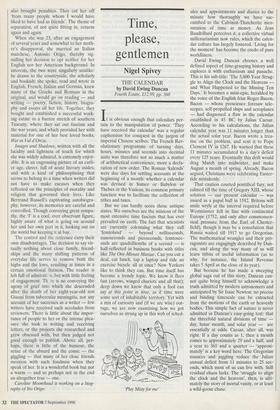Time, please, gentlemen
Nigel Spivey
THE CALENDAR by David Ewing Duncan Fourth Estate, £12.99, pp. 360 It is obvious enough that calendars per- tain to the manipulation of power. 'They have received the calendar' was a regular euphemism for conquest in the jargon of imperial Chinese scribes. The French Rev- olutionary programme of turning days, hours, minutes and seconds into decimal units was therefore not so much a matter of arithmetical convenience, more a decla- ration of new order. The Roman `kalends' were due days for settling accounts at the beginning of a month: whether a calendar was devised in Sumer or Babylon or Thebes or the Vatican, its common primary function was to facilitate the collection of tithes and taxes.
But we can hardly scorn those antique states. We ourselves are the minions of the most extensive time fascism that has ever prevailed on earth. The fact that scientists are currently colonising what they call lemtoland' — beyond milliseconds, nanoseconds and picoseconds, femtosec- onds are quadrillionths of a second — is half-reflected in business books with titles like The One-Minute Maniac. Can you cut a deal, eat lunch, tap a laptop and ride an exercise bicycle all at once? New Yorkers like to think they can. But time itself has become a trendy topic. We know it flees fast (arrows, winged chariots and all that); deep down we know that only a fool can say at this point in time, as if time were some sort of inhabitable territory. Yet with a mix of curiosity and (if we are wise) out- rage, we are now examining how we got ourselves so strung up in this web of sched- Play Misty for me' ules and appointments and diaries to the minute how thoroughly we have suc- cumbed to the Calvinist-Thatcherite men- suration of time as money. As Jean Baudrillard perceives it, a collective virtual millenarianism now rules, which the calen- dar culture has largely fostered. 'Living for the moment' has become the credo of pure worldliness.
David Ewing Duncan chooses a well defined aspect of time-grasping history and explores it with enthusiasm and panache. This is his sub-title: 'The 5,000-Year Strug- gle to Align the Clock and the Heavens and What Happened to the Missing Ten Days.' It becomes a mini-epic, heralded by the voice of the English friar Roger Bacon. Bacon — whose prescience foresaw tele- scopes, self-propelled ships and aeroplanes — had diagnosed a flaw in the calendar established in 45 BC by Julius Caesar. According to his calculations, the Julian calendar year was 11 minutes longer than the actual solar year. Bacon wrote a trea- tise on the problem, and sent it to Pope Clement IV in 1267. He warned that these 11 minutes accumulated to a day's deficit every 125 years. Eventually this drift would drag March into midwinter, and make August a month of spring. Already, Bacon argued, Christians were celebrating Easter- tide mistakenly.
That caution courted pontifical fury, not calmed till the time of Gregory XIII, whose solution — our present calendar — was issued as a papal bull in 1582. Britons will smile wryly at the interval required before Westminster fell in line with continental Europe (1752, and only after commonsen- sical pressure from the Earl of Chester- field), though it may be a consolation that Russia waited till 1917 to go Gregorian. The mathematical wrangles and their pro- tagonists are engagingly described by Dun- can, and along the way many of us will learn titbits of useful information (as to why, for instance, the Inland Revenue takes 5 April as the close of its year).
But because he has made a sweeping global saga out of this story, Duncan can- not quite bring himself to acknowledge a truth admitted by modern astronomers and anticipated by Sir Isaac Newton: no precise and binding timescale can be extracted from the motions of the earth or heavenly bodies. This simple fact of nature is never admitted in Duncan's easy-going text: that the threefold natural divisions of time day, lunar month, and solar year — are essentially at odds. Caesar, after all, was right. If a day counts as 1, then a month comes to approximately 29 and a half, and a year to 365 and a quarter — 'approxi- mately' is a key word here. The Gregorian nuances and juggling reduce the Julian annual deficit from 11 minutes to 25 sec- onds, which most of us can live with. Still residual chaos lurks. The 'struggle to align the clock and the heavens', then, is ulti- mately the story of mortal vanity, or at least a wild-goose chase.


























































 Previous page
Previous page